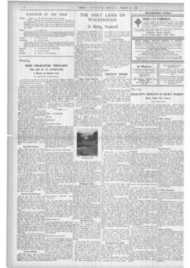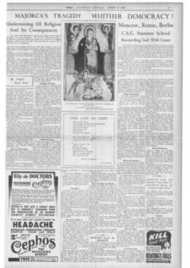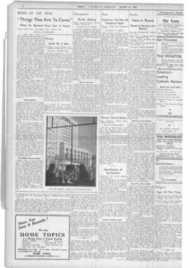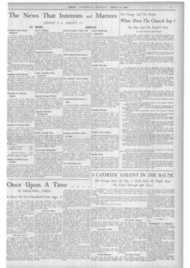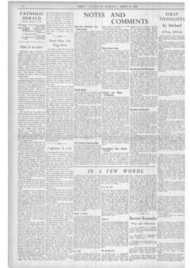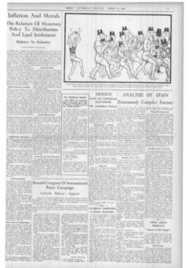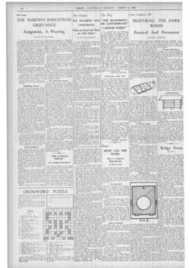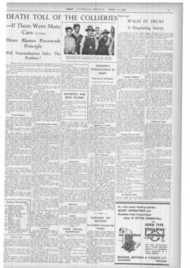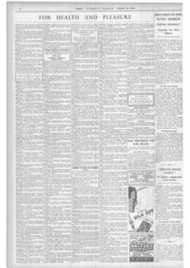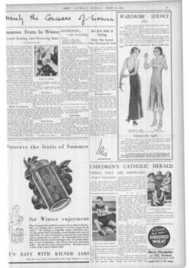Page 4, 14th August 1936
Page 4

Report an error
Noticed an error on this page?If you've noticed an error in this article please click here to report it.
Tags
Share
Related articles
The Soviet In Transition
New Things And
Tempestuous Saint In Politics
Religion In Russia A Purified Christianity
The " Daily Worker's " Facts To Assist The Daily
"Things That Are To Come"
What Sir Bernard Pares Saw In
Moscow Admits a Critic. By Sir Bernard
Pares. (Nelson, 2s. 6d.) Reviewed by G. BENNIGSEN
In a slender booklet Professor Sir Bernard Pares gives his impressions of the new Russia he saw when visiting Moscow in the winter of 1935-36. Sir Bernard knew pre-revolutionary Russia rather well he had lived in Moscow, frequently visited the country, studied at the Moscow University, was received as a friend in many houses. He tells us he later denounced Bolshevism, and in public lectures did his best to counter Bolshevist propaganda in England. Then came the realisation that Communism was to stay, and with it an itch to see how the " great experiment " actually works.
The title of the book is misleading, for it is in no spirit of criticism that Sir Bernard set forth on his journey of investigation. Indeed, he seems to be at great pains to gloss over all that a more impartial observer would not have left unnoticed. On the eve of his departure from Moscow Sir Bernard promised a prominent Communist to write four articles: " On your constructive work-which I shall praise; on your social services-which l'shall largely praise; on education; and my last article will be called desiderata.'"
Sir Bernard has amply fulfilled his promise, or rather intended to fulfil it, for despite his anxiety to please his new friends, he is at a loss to show any actual achievements at the present motnent. In the way of construction all seems to be yet in some near or remote future: Moscow is to be double its present size, colossal towns to be constructed, huge factories to be erected, rivers to be straightened, conditions in the Caspian Sea to be radically changed, etc.
Shoddy Building Of course the professor notes the recent buildings in Moscow which, his specialist friends told him, have "a more solid and permanent look than some of the earlier constructions of the First Five Year Plan." but he prefers to shut his eyes and ears to all contrary facts : A conference of builders, which sat in Moscow during Sir Bernard's visit, was very outspoken upon the shoddy building of houses, a fact which Sir Walter Citrine, an observer of a very different kind than Sir Bernard, corroborates.
To the list of what Sir Bernard " has seen" one may add a much longer one of what " he has not seen "-but should have been aware of as student of Moscow life : the increase of hooliganism among stray children, necessitating the imposition of capital punishment upon children from the age of 12; the loss of children left by their parents in homes; the figures of abortions which, in Moscow, were three times as numerous as births; the permanent shortage of the most elementary drugs, etc.
In the realm of education, Sir Bernard has failed to see the appalling results of Soviet schooling-the breakdown of the " system of pedology," wholesale ignorance of students and teachers alike, a general lowering of culture. He mentions certain decrees, which mean nothing else but the return to the old educational systern, which Sir Bernard has to confess " was a particularly good one."
Three Million Interned: Official Professor Pares, on several' occasions, refers to the wholesale expulsions from Moscow, "including many of the old and infirm "-which helped to people the capital with satisfied and happy Communists. Neither is he worried by the figure of more than three millions confined in concentration camps. (This is the official figure, the actual one being possibly higher.) He speaks of " three successive good harvests," forgetting at the moment, intentionally or not, the dreadful famine of 1933-4 in South Russia, when several million people died of hunger, and his statement that Yaroslavsky's attack on religion "has aimed not primarily against believers . . . but against the ministers of religion as such" shows Sir Bernard's ignorance of the subject.
The Great Quest. By the Rev. A. J. A. Gille, Ph.D., D.D. (89, Avenue Road, N.W.8, 2s.) Herein Dr. Gille briefly surveys in masterly fashion the spiritual city of God, selecting certain aspects of dogmatic theology so as to form a sequence of thought which " may assist the modern mind in the quest for God and the building up of spiritual life." It will be found an admirable basis for retreats and for the religious instruction, both for children and adults. History of Pembroke College. By Aubrey Attwater. (Cambridge University Press, 5s.)
This is an exceedingly interesting history of the fourth oldest foundation in Cambridge. It is regrettable that the untimely death of the author has deprived readers of a more comprehensive volume, but the additions and writings carried out by Mr. S. C. Roberts have given the drafted book a completeness that the author would have wished. and other spiritual means which, the author states, were far in advance of the treatment given to a modern mental hospital! Later on these practices were debased by an element of superstition, in the way, for example, that relics were used almost as charms and amulets (and this is not unknown to-day). Scientific medicine was then in its beginnings, or rather, its recovery from the eclipse of Greek learning.
Coming to modern days, the author is somewhat disparaging about Lourdes, although he has obviously studied Catholic books on the subject. This is because he is anxious to show that even cases of spiritual healing which are named miracles, although of divine,origin, do not go beyond natural laws but are produced through them-by an intensification of the undoubtedly powerful action of " mind over matter."
In this, as in his appraisal of the Lambeth Report on spiritual healing, the author shows himself 'a good Protestant, but he is also a good scholar and his erudition and thoroughness deserve, much praise.
The Meaning of the Mass. By John Kearney, C.S.Sp. (Burns, Oates and Wash
bourne. 5s.). Father Kearney's book is directed towards the laity in order to give those who assist at the Holy Sacrifice, a deeper understanding of its work. It is doctrinal rather than devotional.
Essays in Satire. By Ronald Knox. (Sheecl and Ward, 2s. 6d.). These essayson everything and anything-have already had a wide public. They are re-issued now at 2s 64.
blog comments powered by Disqus



